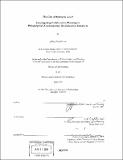The City of Brotherly Love? : investigating collaborative planning in Philadelphia's contemporary revitalization initiatives
Author(s)
Hébert, Jeffrey Paul, 1980-
DownloadFull printable version (6.964Mb)
Other Contributors
Massachusetts Institute of Technology. Dept. of Urban Studies and Planning.
Advisor
Lorlene M. Hoyt.
Terms of use
Metadata
Show full item recordAbstract
The revitalization of many cities across the United States is much less focused on the development of the city center and its flagship projects than was the case a decade or so ago. Substantial investment has begun to flow into once forgotten, deteriorating urban neighborhoods and community groups are becoming prominent voices in the reshaping of communities. Based on Naomi Carmon's Stages of Urban Revitalization and Patsy Healey's theory of collaborative planning, this thesis presents a theoretical framework that argues that a new stage of urban revitalization practice has emerged. Carmon's research describes three stages of urban revitalization since roughly 1940: The Bulldozer Era (1 940s - 1960s), Neighborhood Rehabilitation (1960s - 1970s), and Center Ciy Revitalization (1970s - 1990s). She then argues that since the late 1990s, a new urban revitalization paradigm has emerged that is more neighborhood focused than the previous stage. Healey describes collaborative planning as the coordination between hard infrastructure (city agencies) and soft infrastructure (neighborhood groups) that produces community plans. This thesis argues that contemporary revitalization planning is a combination of the two. (cont.) Today, revitalization planning both emphasizes neighborhood revitalization - as outlined by Carmon - and collaboration - as outlined by Healey. American and European examples are presented to illustrate this theory. In addition, interviews were conducted with representatives of Philadelphia city agencies and Old City neighborhood groups to investigate the presence of this proposed fourth stage in Philadelphia. The findings of this thesis suggest that neighborhood focused collaborative urban revitalization planning is emerging as a contemporary model - validating the concept of the new stage of urban revitalization practice.
Description
Thesis (M.C.P.)--Massachusetts Institute of Technology, Dept. of Urban Studies and Planning, 2004. Includes bibliographical references (leaves [76]-79).
Date issued
2004Department
Massachusetts Institute of Technology. Department of Urban Studies and PlanningPublisher
Massachusetts Institute of Technology
Keywords
Urban Studies and Planning.